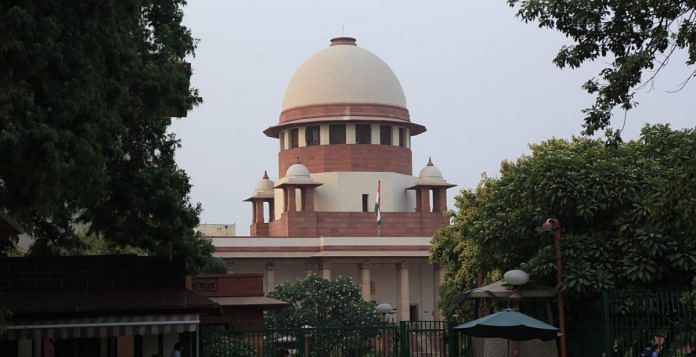Accuses Modi government of ‘stonewalling of judicial appointments’ and interfering ‘in the due process of law’.
New Delhi: An NGO has filed a petition in the Supreme Court seeking directions to the Centre to process the names of judges recommended and then reiterated by the apex court collegium for elevation to the higher judiciary.
The Centre for Public Interest Litigation (CPIL), through senior advocate Prashant Bhushan, who is also part of the NGO, has argued that the government “has virtually stalled the process of judicial appointments, by not notifying the appointments of judges” whose names have been “reiterated by the collegium”.
The plea, Bhushan said, has quoted from Supreme Court Advocates on Record Association vs Union of India (1993), in which a nine-judge Constitution Bench ruled that once the SC collegium reaffirmed a recommendation, the Centre was bound to notify the appointment.
Also read: Modi government too wants pliant judges & that’s why post-retirement jobs will stay
The petition further says that the Central government returning the names to the collegium was tantamount to “stonewalling of judicial appointments” for “oblique and vested interests”, and is also “interference in the due process of law and the independence and integrity of the judiciary.”
The NGO has further argued that the Centre’s actions have added to the pendency of cases in the higher judiciary.
“Due to this virtual stalling of the appointment process, vacancies in the various high courts and the Hon’ble Supreme Court have been increasingly putting an undue burden on the judges of these courts in dealing with the pendency of cases,” the petition reads.
Stalled appointments of three judges
The petition refers to three cases in which it says the Centre had “violated” the norms for appointment of judges to the Supreme Court and the high courts in the last six months.
The most high-profile is that of Uttarakhand High Court chief justice K.M. Joseph, whose elevation to the Supreme Court has triggered a crisis and created the perception that there is a rift between the government and the judiciary.
The collegium had recommended Justice Joseph’s name this January but in April, the Centre asked the collegium to reconsider its recommendation. The collegium, however, reiterated Justice Joseph’s name earlier this month.
Also read: Modi govt returns names of 2 more lawyers to be elevated as judges after 2 years
CPIL’s petition also cites the case of P. Krishna Bhat, a principal district and sessions judge in Karnataka, whose name was recommended for the high court. It was stalled after a female judicial officer accused the judge of “atrocities and abuse of power”. Even though he was cleared of all charges twice, the HC reopened an inquiry against him, allegedly on the directions of the Law Ministry.
The petition refers to another instance, where for possibly the first time since the collegium system was introduced, the Centre unilaterally amended the recommendation of the apex court body to apply its own writ.
In March earlier this year, the SC collegium had recommended that Punjab and Haryana High Court additional judge Ramendra Jain be made a permanent judge, but the Centre gave him a six-month extension.




The government itself, as the largest litigant by far, has a huge stake in timely disposal of cases. Large sums of money are locked up in tax disputes. An already overburdened judicial system, associated with interminable delays, especially in civil or property matters, reduces the overall quality of governance in the country, which shows up on the incumbent’s Report Card. The apex court has been very patient. It will feel constrained now to codify the procedure for the Collegium’s recommendations to be given effect to by the executive.